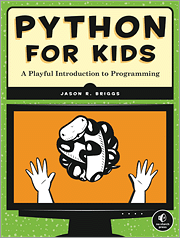New Book Teaches Kids Open Source Programming
You know your programming language is a hit when it becomes the subject of a children’s book — or, at least, a book written for kids. Python, the popular open source programming platform, can now claim that title, with the recent release by No Starch Press of Python for Kids: A Playful Introduction to Programming. Will the book assure your kid’s success as the next prodigy of the computer world?
There’s no shortage of books and other guides — such as the extensive documentation and tutorials on the Python website itself — about Python, which enjoys enormous popularity among programmers, especially in the open source world. As a flexible, extensible language that also encourages users through its very design to follow good programming practices, it deserves that attention.
Book titles intended to introduce children to programming, however, are rarer. There are a few examples out there, but by and large, the market for published programming guides has yet to converge with children’s literature.
In a sign of change, however, No Starch Press — whose products are distributed in the United States by O’Reilly, a huge name in technology and science publishing — recently introduced a guide to Python for kids written by Jason R. Briggs. This is the first children’s title from Briggs, a developer who lives in either England or New Zealand, depending on which source you consult.
According to the publisher, Python for Kids tailors to a young audience with examples that “feature ravenous monsters, secret agents and thieving ravens,” as well as “wacky, colorful art by Miran Lipovača.” Through this medium, the text communicates the fundamentals of working in Python, including dealing with data structures, using functions and modules, handling control structures and more.
To me, learning to program from a book feels ironically old fashioned in the age of the Internet. It’s kind of like using a horse and buggy to tow your car. But for those readers who feel more at home with ink on pages than pixels, Briggs’s book should fit the bill. (For now, the title is available only in print, not digitally.)
What’s more, Briggs and No Starch seem to be latching on to something pretty new. Unlike IT publishing in general, programming literature for kids is a nearly untapped market with plenty of potential consumers. It could be a productive new frontier in IT education, especially in an era when every parent wants her kid to follow in the intellectual paths of people like Bill Gates and Richard Stallman. (Whether one should encourage emulation of the personal choices of such figures, of course, is a separate issue.)
About the Author
You May Also Like


